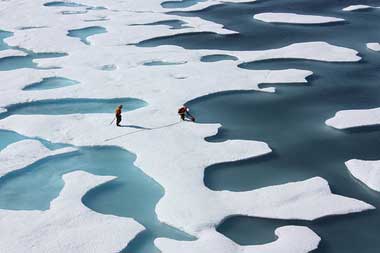China and Arctic exploration
Extensive photographic surveys have confirmed what scientists have long been anticipating in terms of the rapid rate at which the Arctic ice is disappearing. However, what were previously regarded as polar wastelands are now being revealed as potential treasure troves for all manner of natural elements. Naturally, China is keen to take advantage of any of these pockets of oil, gas or other minerals as they become exposed.
The potential for drilling for elements of these Arctic treasures has turned the world's gaze on this frozen realm. Harnessing untapped resources has previously been an area where the Western powers have jockeyed for position, with the USA, Russia and some of the European Union nations all owning territory north of the Arctic Circle. While China has no such territorial claims, it has been deploying considerable wealth and diplomatic influence to bear in this vicinity.
According to Linda Jakobsen, the East Asia program director at the Lowry Institute for International Policy, in Australia: the Arctic has risen rapidly on China's foreign policy agenda in the past two years. She added that there has been considerable exploration by Chinese companies who were very interested to find out about becoming involved in tapping into the polar area's hidden wealth.
Last summer, China sent an exploratory ship across the Arctic Circle to Europe. The country is also lobbying for permanent observer status on the Arctic Council – the body of eight Arctic nations that develops policy for the region. Unlike the major nations that are making claims to the North Pole's potential mineral reserves, China has never occupied large swathes of territory in other lands, having abandoned any colonial aspirations long in its history. It is therefore free of any of the labelling of ‘exploitation' often aimed at Western companies making territorial claims so far from home. In the words of China's State Oceanic Administration, the Arctic is the inherited wealth of all humankind.
As part of its diplomatic endeavours, both with improving its bid to join the council, and in establishing stronger relations with other Arctic nations, Chinese ministers spent much of the summer visiting Denmark, Iceland and Sweden. During this time they managed to broker several lucrative trade deals. There have also been high-level diplomatic visits to Greenland, a location where Chinese companies are already investing heavily in the mining industry.
One reason for the considerable interest in the types of mineral deposits available in the polar region is the fact that the retreat of the ice cap has exposed coveted mineral deposits, such as rare earth metals. These are crucial for cellphones and military guidance systems.

